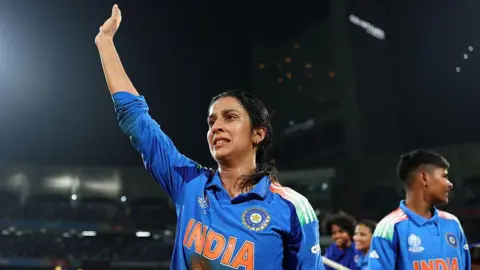 Getty Images
Getty ImagesOn a dewy Thursday night, India pulled off one of the greatest chases in women’s cricket to reach the ICC ODI World Cup final.
At the DY Patil Stadium in Navi Mumbai, they hunted down a record 338 in a pulsating edge-of-the-seat finish – winning by five wickets with five balls to spare.
For defending champions Australia, seven-time winners and unbeaten in this tournament, it was a shattering end to a 16-match unbeaten World Cup streak stretching back to 2022.
India’s fiercest nemesis, the giants of women’s cricket were finally toppled. With Australia out, there will be a new name on the trophy on Sunday.
To beat Australia, India had to match their skill and intensity, and surpass their famed resilience. They shattered a psychological barrier in an exhilarating style, showing grit, commitment, and nerves of steel.
At the heart of India’s stunning win was Jemimah Rodrigues – the batter from Mumbai whose self-belief, skill, and tactical brilliance powered a daunting run chase.
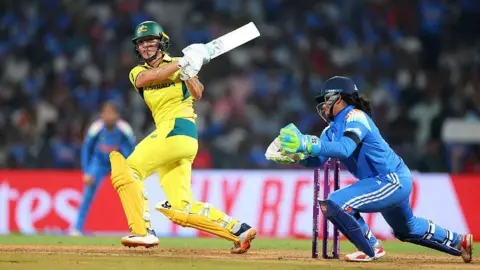 Alex Davidson-ICC/ICC via Getty Images
Alex Davidson-ICC/ICC via Getty ImagesHer maiden World Cup century -127 not out – helped India go past the twists, turns and hurdles during the run chase.
After the match, experts hailed it as the greatest ODI century in women’s cricket in the greatest run chase the format has seen. Few have disagreed.
It was a masterclass from Rodrigues – in both conception and execution.
Her reading of the ebb and flow of play, especially during testing passages was superb. The ability to find gaps in the field, the innovative strokes that disrupt the rhythm of the bowlers and flummoxed fielders, the swift running between the wickets, the capacity to up the strike rate when needed, showcased a batter in commanding form.
What her composure and sublime form didn’t show was the turmoil Rodrigues had been battling before and during the tournament.
It’s an irony now that Rodrigues wasn’t in India’s original World Cup plans – her selection came only after much debate.
If that was disheartening, being dropped from the XI as India slid to three straight defeats was crushing.
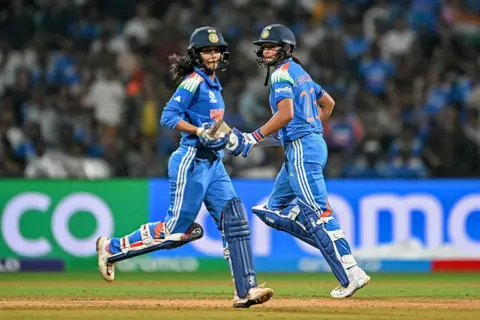 PUNIT PARANJPE/AFP via Getty Images)
PUNIT PARANJPE/AFP via Getty Images)After the match, Rodrigues admitted to battling anxiety through the tournament – uncertain about her place, her role, and her future after being dropped.
“I relied on Jesus to help me out of the mental crisis”, she said.
Faith may move mountains – in Rodrigues’s case, it silenced the demons in her head and steadied her focus.
On her return to the playing XI against the tough New Zealand, she scored a strokeful unbeaten 65. But a far bigger challenge awaited her in the semi-final.
Australia, choosing to bat first, notched up 338, fired by a brutal 119 off just 93 deliveries by 22-year-old opener Phoebe Litchfield and her 155-run partnership for the second wicket with veteran Ellyse Perry.
When these two were together, Australia looked set to score 375 or more, but India’s bowlers pulled back things, preventing the situation from spinning out of control.
Nonetheless, 338 looked an imposing score to overhaul against the all-powerful Australian side, and India looked to have fallen into a familiar hole when hard-hitting Shefali Verma and classy, in-form Smriti Mandhana, fell within 10 overs.
That is when Rodrigues, promoted to No 3 in the batting order, took charge to change the trajectory of the match and redefine her team’s fortune and her own career.
A brisk start showcased her intent. Assuming the role of senior partner, she nursed captain Harmanpreet Kaur through her early tense phase.
As nerves settled, the duo grew in confidence, adding 167 for the third wicket and bringing India within sight of victory.
It wasn’t a cakewalk – the Aussies fought hard, but the defending champions finally cracked.
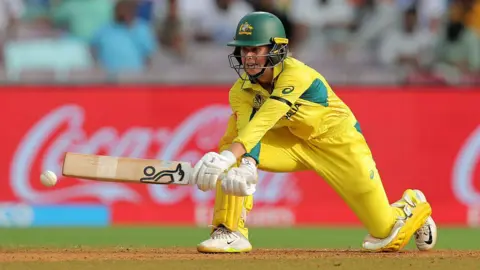 Getty Images
Getty ImagesRodrigues couldn’t keep her emotions in check after the match, nor could captain Singh, who had made a superb 89 in a partnership that helped India pull off the stunning upset.
There was some element of good fortune in India’s passage into the final. New Zealand, for instance, suffered badly at the hands of bad weather which cost them valuable points.
In the semi-final, Rodrigues had a couple of chances (on 82 and 107) as the Aussies uncharacteristically dropped sitters.
But all said, India’s place in the final was well-deserved: for the quality of cricket they have played, as well as the burning desire they have shown. To come back so strongly after losing three matches on the trot was an extraordinary turnaround.
Both semi-finals played on successive days had produced major upsets, making the knock-out stage topsy-turvy and laced with high suspense.
In the final, India will meet South Africa, who’ve had a roller-coaster ride through the tournament, but have shown deep resilience and ambition to reach so far.
Having toppled Australia in the men’s World Test Championship, the Proteas now eye a “golden year” – with the women’s ODI World Cup crown in sight and India standing in their way.
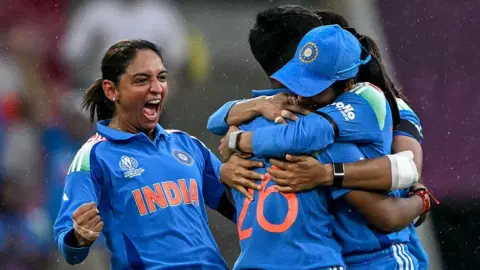 Getty Images
Getty ImagesOn paper, South Africa may trail India, who also enjoy home advantage. But with in-form players like Laura Wolvaardt, Marizanne Kapp, and Nadine de Klerk, they’ve consistently found ways to defy the odds.
India are within touching distance of creating history. A win for India would transform women’s cricket globally, much as happened when Kapil Dev’s unheralded team beat the West Indies in 1983.
India, and the cricket world, waits with bated breath for the outcome of Sunday’s final.
Follow BBC News India on Instagram, YouTube, X and Facebook.



